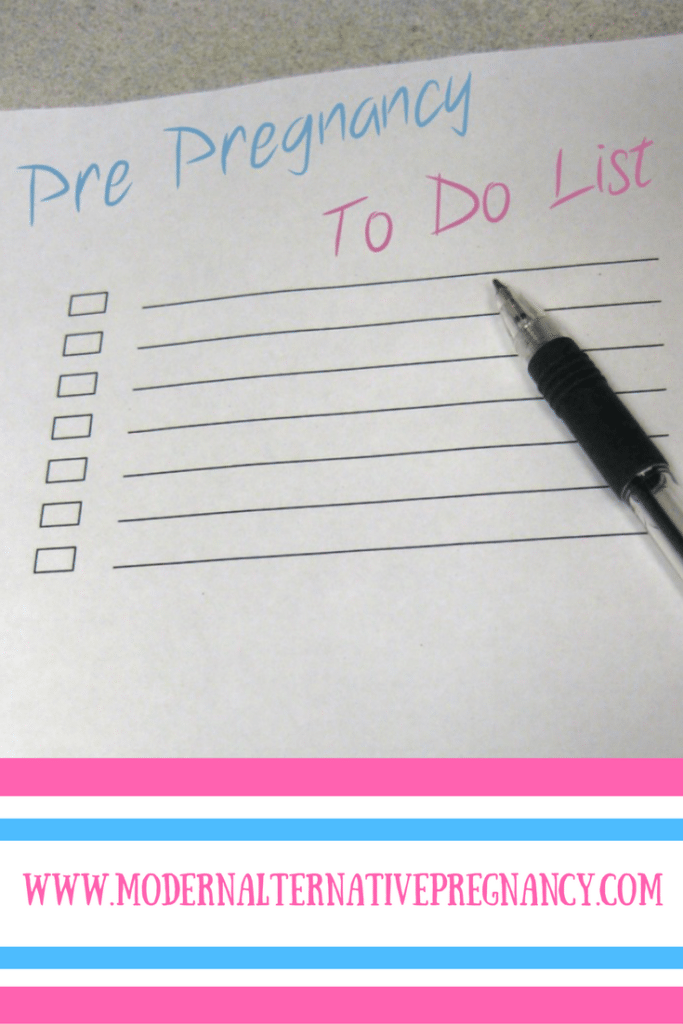Today’s Daily Tip: Start with just one or two goals; if you have too many, you will be less likely to keep up with them.
It’s almost never too early to begin preparing for yourself for pregnancy. Preparing your body, home, and finances for your upcoming pregnancy can make a huge difference in your pregnancy and birth experience.
While it’s tempting to prepare all of those things as soon as possible, let’s focus on your body for right now. Baby steps.
Here’s a pre-pregnancy to-do list to help you on your journey to pregnancy and motherhood.
Diet Changes
If you’re not already eating a healthy, balanced diet free of excess processed foods and chemicals, now is the time to start. Explore your real food options and then eat up! Some good choices are things like:
Bright colored veggies and fruits – remember the colors of the rainbow are important for balanced nutrients
Quality meats that are preferably raised on pasture
Wild caught fish and shellfish like oysters, clams, and muscles from safe waterways
Raw milk or raw milk yogurt
Also, if you’re in the habit of skipping meals, start a new habit of eating regularly, even if that means grazing rather than a few large meals, if that’s more your style. This habit could help with morning sickness once you conceive.
Supplementation
You can begin preparing your body as much to a year in advance with folate and other supplements. Folate is water soluble so when you’re body has what it needs, the rest will be eliminated.
Good quality cod liver oil is also another excellent supplement. The omega-3 fat in cod liver oil helps regulate hormones, promote ovulation and increase healthy mucous in your cervix.
Cod liver oil also contains Vitamin D, which is crucial for the development, growth, and maintenance of a healthy body, starting in the womb. Studies show that adequate Vitamin D levels can also help prevent pre-eclampsia in pregnancy.
Regular Teeth Cleaning
Good dental health can affect the health of your baby. Regular teeth cleaning and healthy gum tissue can help guard against premature birth and lower birth weight.
If you’re interested in more natural dental care, including the use of nutrition to prevent and heal cavities, check out this great post on natural dental health. You can start now and have these habits well-established by the time you’re expecting.
Quit smoking/drinking
The dangers of smoking are numerous and can negatively affect fetal development. Drinking regularly also comes with it’s own list of negative side-effects for your growing baby. Because there is no known “safe amount” to consume during pregnancy, it’s better to err on the side of caution.
If you’re smoking or drinking on a regular, frequent basis now is the time to quit.
Limit caffeine
If you can’t function without your morning java or your afternoon soda you may want to consider limiting your daily caffeine intake now. Some studies show that too much caffeine can increase the risk of miscarrying and once pregnant it can affect your baby’s birth weight.
But caffeine is not just in coffee. Chocolate is another obvious source but did you know that flavored bottled water can contain caffeine as well as over the counter pain medicines and coffee flavored ice cream and yogurt!
Check labels regularly to make sure it doesn’t have additives you don’t want – it’s a great habit to develop before you get pregnant.
How else are you preparing your body for pregnancy? Do you have any tips to make it easier?
SaveSave



Good list! I would add: regular and sufficient sleep/rest, regular physical activity and avoiding soy and environmental xenoestrogens and other toxins (i.e. parabens and pthalates).
Do you know if yogurt can be made the same way with raw goat milk? That is the only raw milk that is legal to sell here in my state.
I have a question about the first trimester – I know that a lot of people close to me and myself struggle with feeling well during the first trimester and mostly crave carbohydrates and have food aversions towards proteins. (Sound familiar!?!)
My question is how this affects your pregnancy, placenta, and the baby (and the baby’s future eating habits)? Does eating well the rest of the pregnancy help build the placenta to still be healthy?